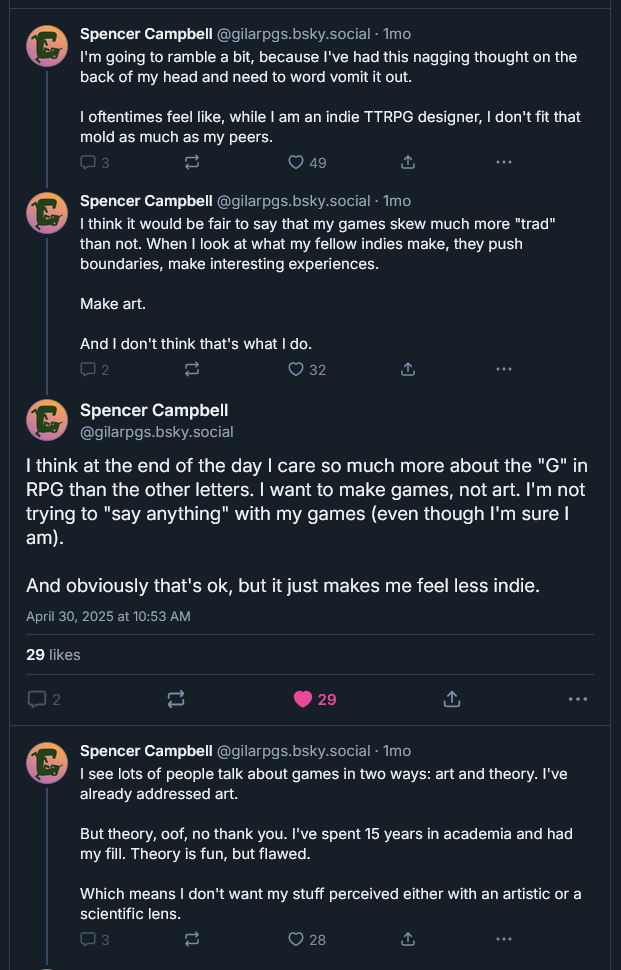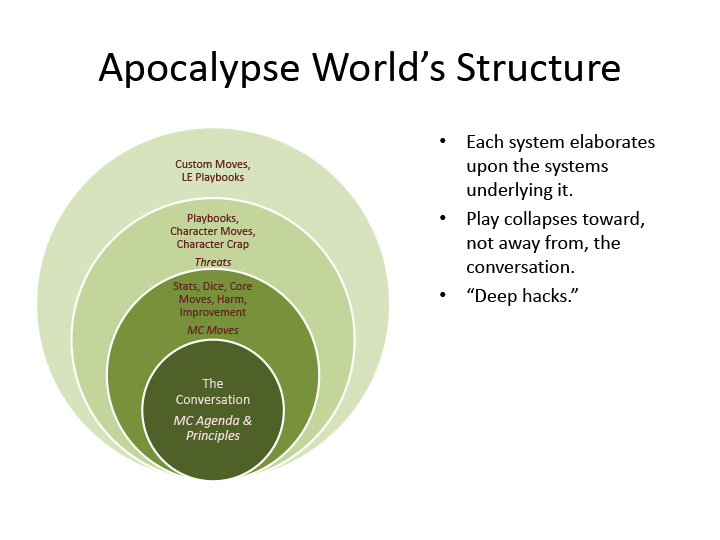About a week ago, I jokingly announced to my friends that I had seen one too many posts about torches. My comrades in the OSR have received abundant mileage from blog posts talking about torches, torch alternatives, lighting, making light matter, and all manner of darkness mechanics. Truly: I love that for them. I am not an OSR gamer though.
Someone commented on the torch post in question that disliking torches equates to being a trad gamer.
This is what very specifically fired my neurons hard enough to write a blog post.
styles of play: broadly
Most people that I read talking about games online broadly separate games into three major categories:
- Trad
- OSR
- Storygame
“Trad” is shorthand for “traditional” and refers to the modern culture of play typically seen in games such as Dungeons & Dragons or Pathfinder. Arguably, this style has been traditional since the days of D&D 3e, with 5e ultimately being a refinement which made the game more accessible and popular to a general audience.
The OSR means a lot of things to a lot of different people so you can never quite be sure what it means when someone uses the term. However, in general, the Old School Renaissance as a movement is about emulating a style of play from the 70’s. That emulation may or may not be grounded in the actual reality of what was happening in the 70’s, but most OSR-style games can be grouped together on a convenient graph. Mostly: they are characterized by high lethality, light rules (and a focus on DM rulings), with most gameplay centering on exploration and dungeon delving. Idle Cartulary has a really good post summarizing the basics.
Despite all games being storytelling experiences on one level or another, “Storygame” is the term the internet denizens have settled on using to refer to games with a strong narrative emphasis. Usually this genre refers to games created in the wake of Apocalypse World, but also includes everything from card oracles to solo journaling. The important thing is that the game in question places the story over the idea of “balance” or “simulation”. Apocalypse World definitely cares about mechanics (play to find out what happens), but those mechanics exist in service to telling a specific kind of story rather than accurately depicting wasteland survival.
“game”

Spencer Campbell‘s design work has been a longstanding inspiration for me. A few months ago, he made this post on Bluesky, where he talked about feeling isolated from other indie designers because the nature of his games focus much more on the “game” part. This resonated with me deeply. What I don’t agree with is the idea that caring about the game part of the rpg means you fall into the trad category. The “trad” label either refers to traditional play, or it’s a misnomer and people are using it to refer to any game with heavy rules. In either case, this manifesto establishes a new label for non-traditional games.
John Bell on The Retired Adventurer establishes six cultures of play:
- Classic
- Trad
- Nordic Larp
- Story Games
- The OSR
- OC / Neo-trad
While I highly recommend you read his post for a more academic taxonomy of play, these labels underscore my purpose. There is a clear difference between trad games and non-traditional game-centric rules-heavy design. People just don’t know what to call it. Beyond “neo-trad”, I’ve seen people use “indie trad”, “contemporary trad”, or (jokingly) “new trad revolution”. All of these terms are an oxymoron still grasping at tradition.
alternative game fantasy

I am not an academic or a historian. This manifesto is observational, or perhaps aspirational at best — not prescriptive. I’m not here to tell anyone how to play or what labels to use. With that disclaimer out of the way, this is the style of play I try to design for and seek when I am playing.
“Alternative Game Fantasy”.
“Alternative” because I define this style in opposition to “traditional”. We are making new games from first principles, our souls unburdened from the weight of 1970’s wargame roleplay. The fantasy we create is in response to, not the inheritor of, the last half-century of elfgames.
“Game” because, like Spencer said: it’s one half of “RPG”. If you subscribe to Forge theory, it’s one third of GNS. The “game” part of ttrpg is incredibly important to me. If I wanted to just tell a story, I’d go write a novel.
“Fantasy” because frankly, I’m only worried about fantasy games right now. Most people don’t reduce game distinction to a dichotomy between OSR and trad when they’re talking about sci-fi. This anomaly is worth further investigation, but is beyond the scope of this post.
death is a status effect
When you run out of health, you respawn back in town. Or someone uses a Phoenix Down. Or the healer casts “Raise”. Or any number of other things, because obviously the protagonists aren’t going to die in a random encounter. Nobody is going to die because of a dungeon trap.

True Death happens in cutscenes. It happens when an arc is complete; it happens when the players at the table decide they are done using that avatar to interact with the game world. Players have conditional immortality: death is (basically) only on the table if it would be heroic or just. Death happens when you martyr yourself in a last stand, or become so corrupted that true heroes must put you down.
anti-random
Encounter balance matters. The game experience is bespoke: custom-tailored to the players to provide an intended play experience. While you can design tables such that rolling on them will tend towards certain results, I suspect that strategy runs counter to what table-enjoyers find fun about them.
I think that “play to find out what happens” can be taken to such extremes that it cheapens the overall play experience. It’s fun to have ambition and goals. That’s why “fail forward” matters, and why I would almost reword the mantra as “play to find out how it happens”. I still believe in emergent gameplay and surprise that happens at the table, but I’m more interested in creating intentional experiences.
the answer is on your character sheet
You can be good at the game.
Beyond the idea of good-as-improv-performance, I believe in the idea of good-as-system-mastery. The ability to understand the rules and use them to build a character that works how you want is a skill. Whether you’re trying to build an “optimal” character or a specific type of funny little guy, being good means understanding how to work in the medium of the system. Whenever you finish character creation, your character sheet should be a collection of rules that describe your character.
rules maximalist
If the OSR tends to claim that its games are “rules light”, then that must make us “rules heavy”, right?
The adjective doesn’t feel right to me because we’re not adding rules simply to make the game more dense. Rules and mechanics are added to a game to enhance the play experience by making players feel special when they get to do something outside the norm. Vincent Baker uses an onion as a metaphor:

A well-designed game is structured such that if players forget rules, there are layers of safety nets and fallbacks so play can continue uninterrupted. The structure of Apocalypse World builds upon the core of a conversational procedure before core moves that anyone can use and then finally individual character moves with unique mechanics for each player. Everyone at the table doesn’t need to know how everyone else’s rules work. If someone forgets a rule, it’s not a problem.
There are so many edge cases I think of when I try to put these thoughts to paper. Writing a manifesto for a style of play is difficult, because I can easily imagine one specific game fitting a mold, but I have to consider all possible games that belong in the category. Perhaps that makes this post merely a first draft — a line of thinking that will be refined over time.
Let me know what you think.

1 Comment
We’ve spoken enough about my personal tastes that Im sure you know exactly where my ideal game differs from yours- but Im thrilled to read this manifesto. Very clear about your aims with supporting evidence leading to your points so im over here clapping like a seal. Good Post, OP